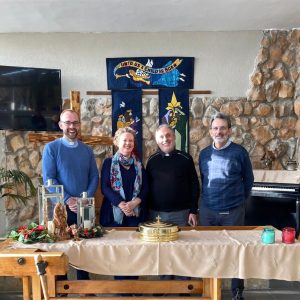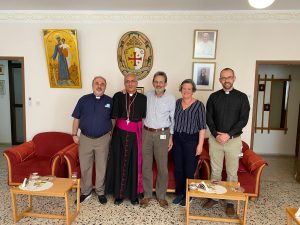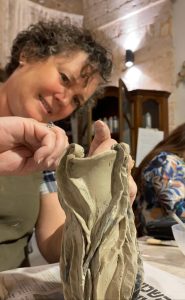Christine Farah, originally from the North of England, moved to Nazareth when she married Elias, a Nazarene. Her journey at the Nazareth Trust began in 2009, when she helped establish the SERVE programme, which launched in 2010. Christine worked as the SERVE Director for many years until the COVID-19 pandemic changed everything…

Christine with other members from the Pastoral Care team in the hospital’s chapel
The best thing is always the people. I used to joke and say we meet the best people from all around the world, but we really do. Working with SERVE, you meet people who have a heart for this place and a heart to serve. You’re preparing for them coming to Nazareth, but they also have an impact on you – and that’s always the best part; getting to know people and enjoying their company, being encouraged and uplifted by them.
Helping set it up from scratch is interesting. It’s a bit of a mixed bag. You feel you have a lot of input and experience and can try to build it the way you like. But it’s also a learning process which can be hard because when things don’t work, it impacts people’s experience; that was the hardest part for me: trying to make sure everyone’s happy.
So many things. A lot of the things had to do with leadership and ministry, and that’s always really challenging. I had never been in a position of leadership before. One of the biggest spiritual and life lessons was: “You are not fully in control. Don’t be completely self-reliant”. You have to rely on God also because He has a bigger picture, and He is working things out in a different way. In leadership, you always get lots of praise and criticism at the same time and trying to stay grounded can be hard. You’re not as great as your biggest fan says you are, and you’re not as awful as your biggest critic says. You’re somewhere in the middle, doing the best you can. Don’t let criticism bring you down!

Congratulatory visit of the Pastoral Care Team after Bishop Rafic Nahra was ordained.
The pandemic had a huge influence on my decision. When COVID hit in March 2020, we had to take the decision to send everybody home, which was not easy. I remember the last person going and thinking: “What happens now?”. Everything stopped. Everyone has gone, so I don’t have a job anymore. Soon after, we had a meeting with our CEO Richard, who told us he wanted us to focus on providing pastoral care to staff. We have a chaplain here, but he also wanted others to join.
Everyone else in that meeting was male, so obviously, you need a female. It seemed like the obvious decision that I would agree to help. There are departments like the maternity ward where it’s all women, so it would be appropriate for me to help there. Then we started to plan how to provide pastoral care safely in the times of Corona. As it went on, I realised how much I enjoyed that work. I had done pastoral care work before when I tried to meet with the volunteers every week, but the busier we got, the more that was slipping. I realised how much I missed it. I really enjoyed catching up with people and seeing where they’re at, praying with people when there was an opportunity.
For many years, I’d been looking at either a Master’s or other courses I could do, and I could never decide what to do. We had this chaplain from the UK that was supporting us: Christy Smith. He said: “Why not chaplaincy?” Everything was fully online. I found a course, and it seemed perfect. I applied, got accepted and started studying a Master’s program at the end of 2020. I realised this was the perfect match between theology and counselling. Richard interviewed me for one of the videos to promote pastoral care, and he said: “I can see what the Lord is doing; he is calling you for pastoral care, so we will look for a replacement for SERVE”. That was exactly what I wanted.
It’s a comparative study of the spiritual responses of Christian and Muslim health workers to the COVID pandemic. I’ve interviewed several people. I am now analysing those results and will be writing that up soon.
Sometimes in chaplaincy, they are the same thing. One of the most challenging things is when you have people who are chronically ill and approaching death. But also, some of the most rewarding times. If you can minister to someone in that journey, it’s a real privilege to be allowed in that space. Very early on, when we started working as a team, there was a patient who knew they were dying and specifically wanted me to accompany them (because I had met them before) through that difficult time and physical deterioration; pray with them and support them. It was one of the hardest things and one of the best things also because you could see it made such a big difference to them and their family. It’s hard not to be emotionally attached and grieving when that person passes away, but it’s only natural.
We are very lucky in this land: when we meet people of different religions, most of them believe in God… despite our differences, we can share something meaningful.
That’s a really tricky question. There are so many definitions of pastoral care. A long time ago, when I did a course in Christian leadership, they challenged us to think: “What is your purpose in life? What do you want to be written on your tombstone?” Since then, I have always had this image of walking along the road and meeting with people at different stages. You walk together for a time, support and challenge each other, hopefully help each other grow spiritually, and the road always goes hopefully towards the Lord. This is something I really saw with SERVE, and it’s the same where I am now.
In terms of providing pastoral care to people with different religions and cultures, I’ve been really fortunate to work alongside Pastor Suheil, who has many years of experience. I learned a lot from him, how he bridges any gaps. We are very lucky in this land: when we meet people of different religions, most of them believe in God. It’s amazing that despite our differences, we can share something meaningful.
I think, inevitably, it’s different. My experience of pastoral care in the UK is very limited because I have never worked there in that capacity. I think, in some ways, we have more freedom here to approach people, including people of different religions. We always ask for their consent to visit and get a bit more of a welcome. In the UK, you can’t take it for granted. If you ask some people if they’d like to see a chaplain, you might get quite a negative response.
I would think so, and everything is always changing. Most people we see are quite receptive to the concept of God, the idea of prayer and being prayed for. In the UK, you have chaplains in hospitals but also shopping centres, airports, prisons, the police, etc. Here in Israel, chaplaincy isn’t provided everywhere. There isn’t really a word for it! Some places have spiritual care for the staff of different religions, but it’s not the norm.
Yes, people are often surprised: “Really? You’re employed to do this?” It’s an odd concept to people, but people of all backgrounds are very receptive. The spiritual aspect is very important, so they appreciate that we recognise that God is involved in their treatment.
I would love to see a bit more integration. There’s been some really good research recently that’s been looking at the importance of pastoral care for people with serious illnesses. I would like to see pastoral care and chaplaincy more recognised in the treatment team. There are patients that really need this alongside their physical treatment. It would be really helpful to know where the challenges and serious illnesses are. I think it can come but will really take time.
Absolutely. We don’t always have much detail of their medical record, but if a doctor tells us: “You need to see this patient”, we go. Sometimes it’s because they noticed patients with pictures, icons or prayer cards next to them while they’re sick. This means they are handling their illness in a spiritual way, and they would be a good candidate for a pastoral care visit. They would really appreciate it because they need spiritual support. However, we visit every room. We are a Christian hospital, so we’re here to care for you in every way, not only physically but also spiritually.
This is a funny question because I was only recently thinking about that. I remember when I was maybe 5 or 6 years old, and people would ask: “What do you want to do?” and I said I wanted to be a nurse. It’s funny because I didn’t know what nurses do; once I learned what nurses do, I lost interest. They do a very valuable job, but it’s not for me. Recently I was thinking about it again: “I said I wanted to be a nurse, and here I am, in a hospital”. But my concept of a nurse back then was sitting next to the patient, comforting and caring for them in an emotional way rather than a physical way, and it’s very similar to what I ended up doing. I was right; I just didn’t have the word ‘chaplain’ to explain what I wanted to do. This was always where I wanted to be.
Yes, I go once a week to a pottery studio. We joke that this is our therapy for the week. It’s a good place to do something entirely different from our day jobs, using our hands, moulding and shaping something. It’s a good place to reflect and switch off. There’s something creative about it and the joy of being relaxed and enjoying the process. A piece is never lost; until you fire it, it can always be changed. We have lots of verses in the Bible about God as a potter, and there’s lots of things you can learn from that: whether you have to be tough or gentle with the clay, etc. There are different processes involved in working with clay, and from all of them, you can bring out spiritual messages. It’s a long process, like a life cycle: making the clay, as you see in the Nazareth Village, preparing it, drying it, firing it. There’s always some risk of things being broken. I haven’t thought super deeply about it, but I really enjoy it.
